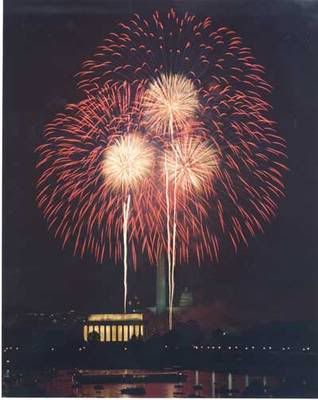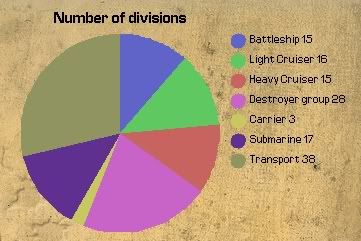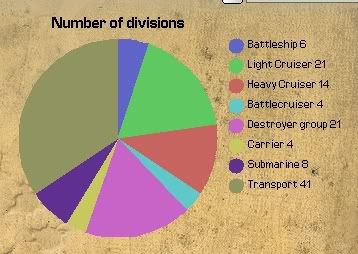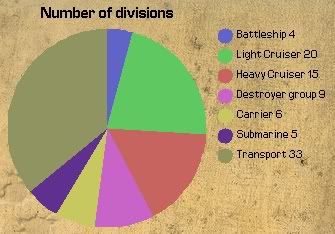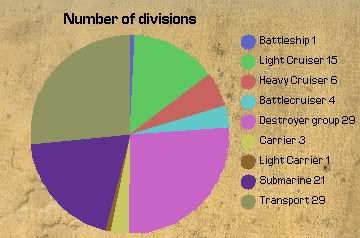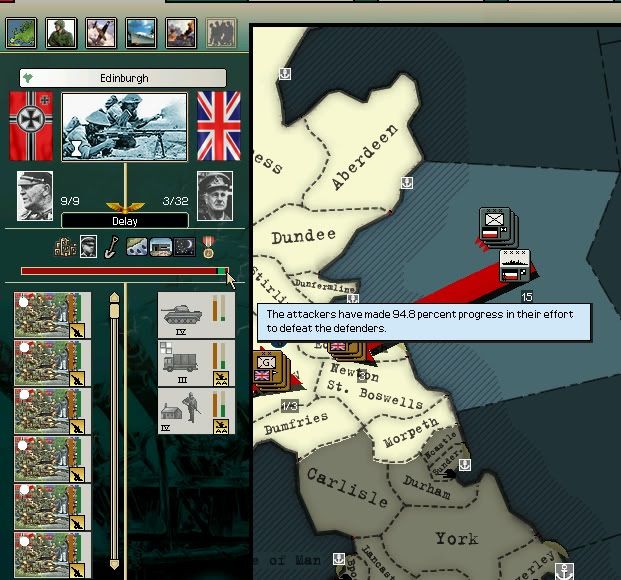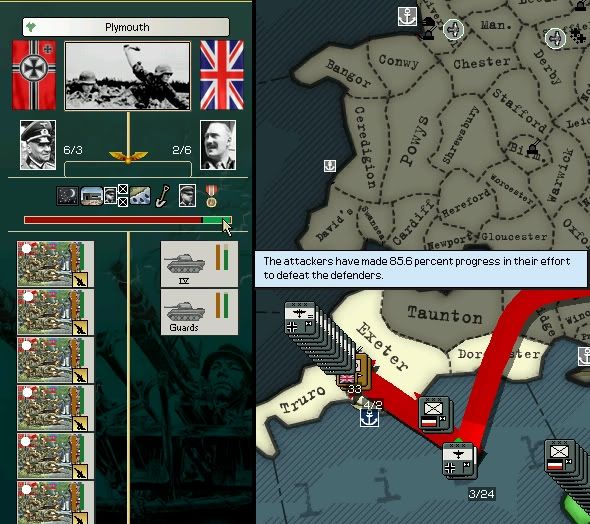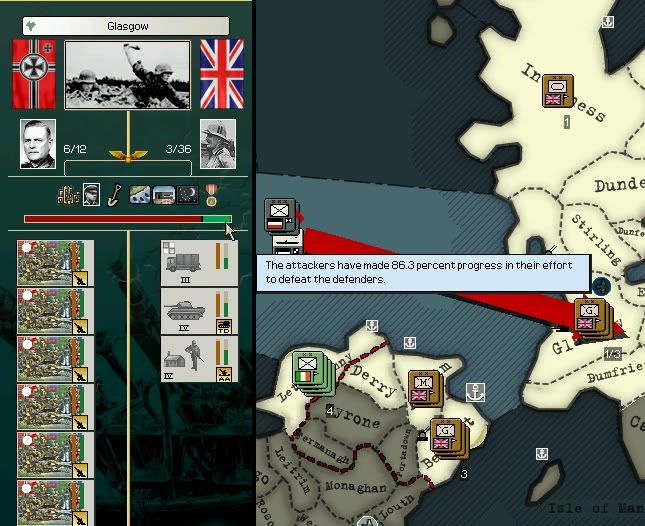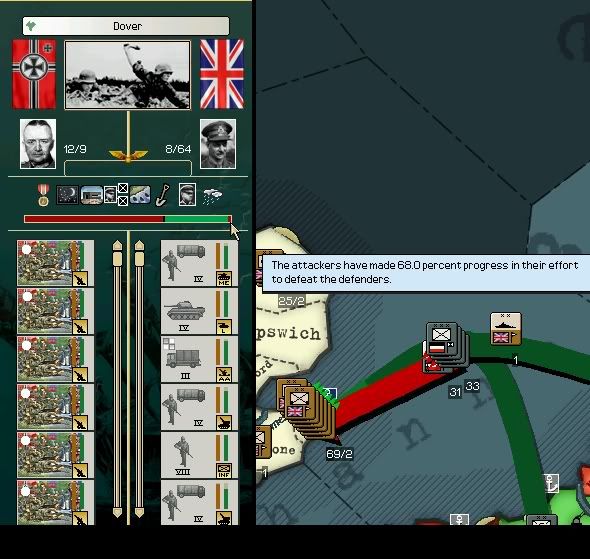Fortress England: The First Day
[FONT="]August 2, 0200 Hours: The Cliffs of Dover[/FONT]
[FONT="]Searchlights switched on the command of Radar Command to guide the few remaining fighters and the lighter AA guns to their targets. Tracer fire lit up the night sky, but it was not directed at the low-flying helicopters rapidly approaching the Western Heights. The nearest guns were directed at the dive bombers making passes at the fortifications of the Citadel and the associated buildings and more importantly smashing up the road leading to the Redoubt.[/FONT]
[FONT="]Screaming down from the sky the Herschels loosed their bombs and missiles at the defenses. Heavy and accurate anti-air fire brought down one of the Herschels straight down on the position of one of the coastal gun emplacements destroying the aircraft and rendering the gun unusable without several hours of debris removal.[/FONT]
[FONT="]The first wave of the air assault was comprised of three elements with distinct goals for each. The first unit was tasked with the Citadel itself, the second dealing with the Western Heights and the heavy guns there, and the third group was tasked with securing or at least neutralizing Dover Castle and Fort Burgoyne just to the north of the castle. The castle protected the landward approach into the city while the Fort did much the same thing for the castle and had heavy guns emplaced as well. From seaward a small group of seaborne commandos attached to the regular landings would attempt to enter the harbor via small torpedo boats and submarines to disable as much of the explosives lacing the harbor as they could. It mattered little if they couldn’t secure the harbor intact here as long as the landing forces at Plymouth took their harbor intact and could link up with these forces. The landings up and down the coast of England were designed to bring England’s war machine to its knees even if they never advanced beyond the harbors.[/FONT]
[FONT="]That being said no plan survives contact with the enemy.[/FONT]
[FONT="]The Mouth of the Thames, 0200 Hours[/FONT]
[FONT="]It was an uneventful patrol for the the HMS
Glasgow Jerry was all nestled up in Europe and the threat from U-boats had never materialized in this war so it was a rather pleasant cruise. Still the lookouts were on deck looking for enemy ships and aircraft. [/FONT]
[FONT="]“This is RAF Home Command,” the radio said crackling to life. “Be advised of heavy German air activity in the vicinity of Dover and Plymouth.”[/FONT]
[FONT="]With that the officer of the watch immediately sounded General Quarters and everyone woke from their slumber scrambling for their action stations.[/FONT]
[FONT="]“Turn on the searchlights, maybe we can bag one of those aircraft,” her captian ordered as he came into the bridge.[/FONT]
[FONT="]“All stations report secured,” One of the seamen told anyone willing to listen.[/FONT]
[FONT="]And the big searchlights mounted on the
Glasgow came to life… to her worst nightmare. There were at least 2 battleships in range of the searchlight and another 6 or so Pocket Battleships that obviously were in range of the
Glasgow as their turrets were turning to fire upon her. But most terrifying of all was the sight of dozens of landing craft slowly moving towards shore. Towards England. Towards HOME.[/FONT]
[FONT="]“All speed back! Pilot get us out of here! Guns, fire on those landing craft! Communications get on the wireless and radio Fleet. Tell them we have a large Jerry fleet here with transports.” He shakes his head to clear it. “We will attempt to avoid contact until the time that we can get a signal back from anyone acknowledging our transmission. Then we bore in on the transports.”[/FONT]
[FONT="]Minutes later with shells crashing down all around her the signal was acknowledged, but she could not close to the range of her own guns watching the invasion begin.[/FONT]
[FONT="]The Western Heights 0230 Hours[/FONT]
[FONT="]The air assault itself was rather successful; all of the sticks from the first wave landed without incident and immediately began their assaults on their targets. [/FONT]
[FONT="]The men attacking the Citadel were dropped straightaway into the parade grounds allowing each stick of men to fan out to their own objectives. A company each was detailed for the Inner Citadel and its armory, another for the tunnels and the artillery batteries, while the third was detailed for the outer perimeter and the barracks with the presumably sleeping British inside. [/FONT]
[FONT="]Hauptmann Weiss led the stick he had come to England with, less two men to find the other elements of his company detailed for the assault on the Inner Citadel and the Armory inside. But he could not wait for the remainder of his company to form to hit the defenses. Casualties be dammed, anything they suffered now would be far less than if the British had time to set up their weapons and get into a proper defensive position, they had to do it now. [/FONT]
[FONT="]The doors to the armory had been upgraded from their original construction to better suit the more modern environment in which it now existed. Steel blast doors blocked their path into the armory. The sound of a raving buzz-saw ripped though the night air overwhelming even the anti-aircraft batteries for a moment. “No point in being quiet anymore. Get a satchel charge on that door and knock hard!” At this the rest of the stick took up defensive positions covering the demolitions pioneer. One of the runners returned with three other platoons. [/FONT]
[FONT="]“Pilot started following the wrong chopper! The rest of the company is with third group starting to clear out the castle itself and set up our anti-armor weapons.” The trooper exclaimed out of breath. It looked like he ran both ways.
[/FONT]
[FONT="]With the charge set and the British nowhere to be seen yet, but that situation was bound to change soon. Time to act. [/FONT]
[FONT="]“Blow the charge.” [/FONT]
[FONT="]With a decidedly small report the satchel charge detonated and sent the steel door to the armory went flying, bent and broken, down the narrow corridor. The newly arrived sections went in first trading fire, with the handful of men on guard duty, British pistols and German automatic rifles. The rifles and the mass of Germans carried the day.[/FONT]
[FONT="]“Wire the armory for detonation and run at least two detonators to the explosives. I want two sections on sentry duty for this building, the rest of you secure and clear the building. I don’t want any surprises to pop out at us. Clear?”[/FONT]
[FONT="]The rest of the teams assigned to capture the Western Heights did not have this sort of luck. Stumbling into armed patrols, they were forced to spend precious minutes engaged in a firefight that seemed to never end. Only timely reinforcements allowed the Germans to turn the tide of battle and take the Heights. By that time however the sun was up and the garrison had long since been alerted, but it mattered only to silence the guns that would have otherwise fired on the invasion fleet. But the landings were on schedule and by 0400 hours at all invasion sites under the cover of the guns of battleships and cruisers German troops came ashore to rid the world of the tyrannical British Empire.[/FONT]
[FONT="]The Mouth of the Thames, 1200 Hours (Noon)[/FONT]
[FONT="]By this time HMS
Glascow had suffered multiple air attacks in addition to the shelling and was listing quite heavily and smoking, having had absolutely no impact on the progress of the invasion save to warn the defenders that the Germans were coming. Half or more of her crew was dead the rest wounded to a greater or lesser degree. She would fight no more. [/FONT]
[FONT="]“Disengage and beach her, we might be able to repair her later. If we have to abandon at least we’ll be closer to shore.” Her captain ordered bitterly. “We’ve done all we can do for now. Run away to fight another day or some such nonsense.”
By 1200 Hours significant progress had been made at all of the landing locations. A beachhead had been established with which to land additional troops under indirect fire only and land supplies that would be critically needed in the days ahead.
The penetration at Edinburg was perhaps the most mature of the landings, but even so they had not managed to throw the defenders completely out of the city as the local garrison fought tooth and nail with every weapon they had to stem the grey tide coming ashore.
The Plymouth landings also were showing great progress aided by more than 30 squadrons of tactical and close air support bombers. The British Armor however was dug in well and deep and the infantry was either forced to expose themselves to fire or wait for artillery or air support to knock out the dug in vehicles.
As with the Glasgow landings the local garrison force was putting up a serious fight holding out long after they should have quit the field. Reconnaissance planes from the carriers quickly found out why. There were more than a dozen divisions headed north at full speed to relieve beleaguered garrison in the city of Glasgow.
Thought the air assault in Dover against the Western Heights was nominally a success it did little to affect the garrison of this important port city. With a heavy garrison of at least 1 panzer division, 4 more motorized infantry, and 3 leg infantry divisions all coordinated by the headquarters of the 3rd British Expeditionary Force which had escaped France from some of these very same divisions only two years ago. Aided by the coastal fortifications the defenders still resistance shattered any quick hopes of a German invasion of Dover like the waves against the cliffs of Dover itself.
[/FONT]


